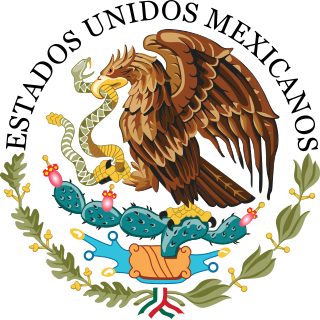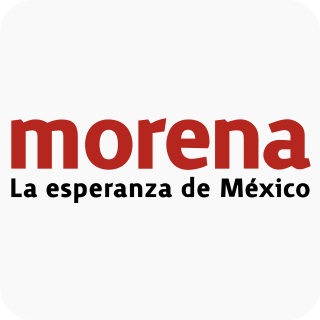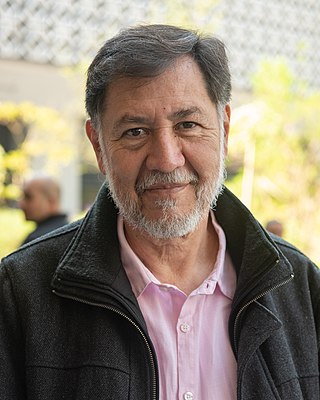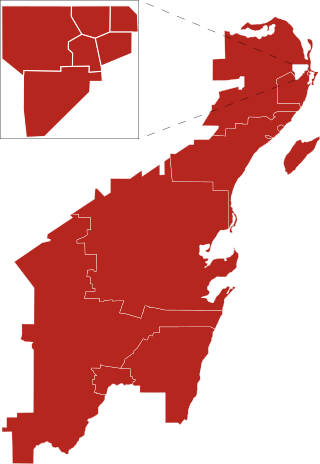
The politics of Mexico function within a framework of a federal presidential representative democratic republic whose government is based on a multi-party congressional system, where the President of Mexico is both head of state and head of government. The federal government represents the United Mexican States and is divided into three branches: executive, legislative and judicial, as established by the Political Constitution of the United Mexican States, published in 1917. The constituent states of the federation must also have a republican form of government based on a congressional system as established by their respective constitutions.

The Party of the Democratic Revolution is a social democratic political party in Mexico. The PRD originated from the Democratic Current, a political faction formed in 1986 from the Institutional Revolutionary Party (PRI). The PRD was formed after the contested general election in 1988, which the PRD's immediate predecessor, the National Democratic Front, believed was rigged by the PRI. This sparked a movement away from the PRI's authoritarian rule.

Andrés Manuel López Obrador, also known by his initials AMLO, is a Mexican politician who has been serving as the 65th president of Mexico since 1 December 2018. He previously served as Head of Government of Mexico City from 2000 to 2005.

The Labor Party is a political party in Mexico. It was founded on 8 December 1990. The party is currently led by Alberto Anaya.

The National Assembly of the Socialist Left was an alliance of left-wing and far-left groups in Mexico. The only assembly of the socialist left for the creation of a "Socialist Front" was held in Mexico City April 16–17, 2005.

Marcelo Luis Ebrard Casaubón is a Mexican politician who served as Secretary of Foreign Affairs until 2023. Affiliated with the National Regeneration Movement (MORENA) since 2018, he was appointed to lead the foreign ministry by President Andrés Manuel López Obrador on 1 December 2018. In June 2023, he resigned from his post to compete for his party's presidential candidacy for the 2024 election.

The Coalition for the Good of All was a left-wing coalition created by the Party of the Democratic Revolution (PRD), Convergence and the Labor Party (PT) to support Andrés Manuel López Obrador as a candidate for the presidency of Mexico in the general election of 2006. The coalition also presented joint candidates for Congressional and local elections.

General elections were held in Mexico on 1 July 2018. Voters elected a new President of Mexico to serve a six-year term, 128 members of the Senate for a period of six years and 500 members of the Chamber of Deputies for a period of three years. It was one of the largest election days in Mexican history, with most of the nation's states holding state and local elections on the same day, including nine governorships, with over 3,400 positions subject to elections at all levels of government. It was the most violent campaign Mexico has experienced in recent history, with 130 political figures killed since September 2017.

MORENA is a major Mexican left-wing political party. It is described as an anti-neoliberal and populist party. It is the ruling party of Mexico since 2018. As of 2023, it is the largest political party in Mexico by number of members.

José Gerardo Rodolfo Fernández Noroña is a Mexican politician and sociologist from the Labor Party. He is known for his protest acts especially starting with the 2006 presidential election. He was a federal deputy on two occasions between 2009 and 2012, and since 2018 he has been nominated by the PT to run as a candidate for the presidency of the Republic within the Together We Make History coalition for the 2024 federal elections

Social Encounter Party was a Mexican conservative political party established on the national level in 2014 and dissolved in 2018. It was part of the coalition Juntos Haremos Historia with the National Regeneration Movement and Mexico's Labor Party for the 2018 Mexican election.

Por México al Frente, also known as Frente Ciudadano por México, Frente Amplio Democrático, or Frente Amplio Opositor ), was a big tent electoral alliance consisting of the centre-right National Action Party (PAN), as well as the centre-left Party of the Democratic Revolution (PRD) and Citizens' Movement (MC) to compete in the 2018 Mexican Federal Election.
Opinion polling was carried out prior to the 2018 Mexican general election.

Legislative elections were held in Mexico on 6 June 2021. Voters elected 500 deputies to sit in the Chamber of Deputies for the 65th Congress. These elections took place concurrently with the country's state elections.

Delfina Gómez Álvarez is a Mexican politician affiliated with the National Regeneration Movement (MORENA) who has served as the Governor of the State of Mexico since 2023. She previously served as the head of the Secretariat of Public Education appointed by President Andrés Manuel López Obrador. She served as a senator from the State of Mexico in the LXIV Legislature of the Mexican Congress. She also has served as a federal deputy and mayor.

Va por México was a Mexican electoral alliance formed by the National Action Party (PAN), the Institutional Revolutionary Party (PRI), and the Party of the Democratic Revolution (PRD) to compete in the 2021 Mexican legislative election.
The Progressive Movement was a political alliance formed between the Democratic Revolution (PRD), Labor Party (PT) and the Citizens' Movement (MC), which contested the 2012 Mexican general election. Its presidential candidate Andrés Manuel López Obrador came in second place, losing to Enrique Peña Nieto.

Bertha Xóchitl Gálvez Ruiz is a Mexican politician and businesswoman. From 2015 to 2018, she served as mayor of the Miguel Hidalgo borough of Mexico City. From 2018 to 2023, she served as a senator in the LXIV and LXV Legislatures of the Mexican Congress. As a senator, she caucused with the center-right National Action Party but often adhered to progressive politics on social issues such as abortion, drug policies, and social spending. She completed her studies in computer engineering at UNAM's School of Engineering. In 2023, she was nominated as the candidate of the Broad Front for Mexico for the 2024 Mexican presidential election.

The 2022 Quintana Roo gubernatorial election was held on 5 June 2022 to elect a new governor of Quintana Roo and 25 deputies to the state congress. Despite Carlos Joaquín González being a popular incumbent governor from the Party of the Democratic Revolution and the National Action Party the race was considered as a long shot due to the state's high approval of López Obrador, Morena's strong showing in the midterms and Mara Lezama's own popularity. On November 3, 2021, it was revealed Marko Cortés, the leader of the National Action Party expected to loose the state along with other four in play. The election resulted in a landslide for Mexico’s ruling Morena party during President López Obrador's first term in office, winning the gubernatorial election. Additionally, they won all 15 local districts with the opposition only getting proportional representation seats.

General elections are scheduled to be held in Mexico on 2 June 2024. Voters will elect a new president to serve a six-year term, all 500 members of the Chamber of Deputies and all 128 members of the Senate of the Republic. The members of the legislature elected on this date will be the first allowed to run for re-election in subsequent elections. These elections are taking place concurrently with the country's state elections.




















